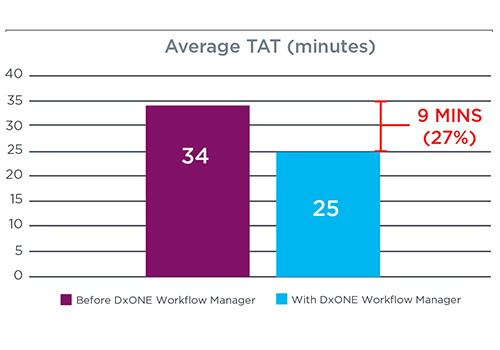Case Study Greater Efficiency and Faster TATs for a Low-volume Lab
Learn how Jefferson Hospital improved TAT by 27% and achieved 82% autoverification using the cloud-based DxONE Workflow Manager middleware solution.
DownloadExecutive Summary
Profile
Jefferson Hospital, in Louisville, Georgia, is a 37-bed acute-care facility. The hospital processes approximately 140 samples per day to support primary medical and surgical care. Ninety percent of patients come from the Jefferson County area.
Challenge: The facility’s goals included improving TAT for quicker response to physicians, gaining the ability to deal with resource constraints and decreasing the need for manual results validation. Jefferson Hospital knew these goals could be accomplished with the support of better informatics. However, any informatics solution would need to fit their budget and limited IT infrastructure.
Solution
- Two DxC 700 AU chemistry analyzers
- One DxI 600 immunoassay analyzer
- One DxH 600 hematology analyzer
- One DxONE Workflow Manager cloud-based middleware
- 3,000-tube stockyard
Results: The cloud-based DxONE Workflow Manager middleware solution enabled the hospital to:
- Decrease TAT by 27%
- Gain efficiency savings that equated to 3/4 of an FTE
- Achieve an 82% autoverification rate
Transformation
Jefferson Hospital was faced with the same pressures as many of today’s low-volume laboratories. It needed to deliver accurate results with faster TATs, while managing resources and workloads. Often, barriers exist for low-volume laboratories seeking informatics solutions, namely costs and limitations in IT systems. The new, first-of-its-kind cloud-based middleware solution DxONE Workflow Manager allowed Jefferson Hospital to use its existing IT infrastructure, reducing disruption to laboratory operations and minimizing costs.
Easy implementation with little disruption
Because DxONE Workflow Manager offers cloud-based technology, Beckman Coulter associates performed much of the preparatory work remotely off-site. This reduced the amount of time required on-site for system implementation, which meant less workflow disruption.
Rapid decision-making with visual cues
An intuitive user-interface on DxONE Workflow Manager gives operators a quick view of inventory and patient data. This eases workflow by allowing staff to see items needing attention, based on on-screen flags, comments and sample statuses. Before going live, Jefferson Hospital had to sort through multiple tabs within its laboratory information system to review and release results.

Faster TATs with testing by exception
Using DxONE Workflow Manager, laboratories only perform manual reviews of samples that fall outside the laboratory's defined parameters. Standardizing workflow through autoverification and automatic reflex testing enabled Jefferson Hospital to streamline processes by 82%, as staff members were able to give attention to outliers only. These made up 18% of the tests. The time saved was equivalent to ¾ of an FTE, and less time on manual review resulted in a 27% improvement in TATs.
Referenced in this case study:
DxC 700 AU chemistry analyzer
DxI 600 immunoassay analyzer
DxH 600 hematology analyzer
DxONE Workflow Manager middleware solution
Never miss another insight
Subscribe to our Diagnostics Today newsletter to stay up to date on the latest news in clinical diagnostics.
 English
English


